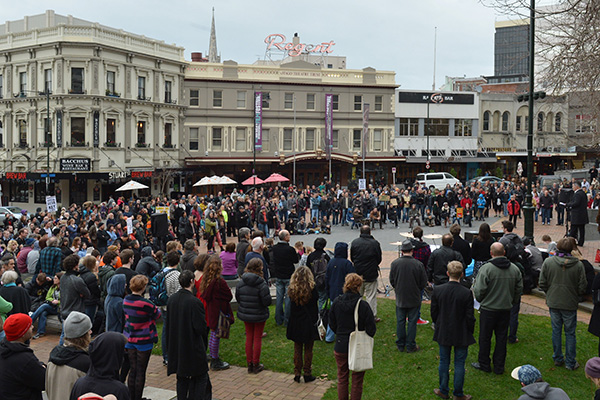Protestors Fight The Pows
Need to Enter Rill Worl
The demonstration was held in conjunction with other protests throughout the country, just days after a packed public meeting in Auckland saw Dr. Rodney Harrison QC, New Zealander of the Year Dame Anne Salmond, Megaupload founder Kim Dotcom and Tech Liberty spokesman Thomas Beagle argue that the Government Communications Security Bureau and Related Legislation Amendment Bill represented an undue invasion of privacy and civil liberties and should not be passed into law.
The Dunedin protest was attended and addressed by a number of local opposition MPs and city councillors. Following a long and ponderous speech by organiser Kieran Trass, Mayor Dave Cull told the crowd that the bill should be rejected. “We value civil liberties and privacy as much as our material security,” Cull said. “That is the essence of a democratic society. That balance is so easily turned over into a police state and a surveillance society. Government is reacting to the wrongdoing of one of its agencies by legalising that wrongdoing.”
Cull’s observation that former United Future leader Peter Dunne’s vote would decide the future of the bill drew cries of “shame” from the crowd.
A statement from Associate Professor of Information Science Hank Wolfe was read at the rally. Wolfe countered government claims that the new spying powers were needed “to look after New Zealand and protect New Zealanders’ safety,” and asked, “who exactly is the enemy that poses a serious enough threat to warrant such oppressive legislation? I am not aware of any rational justification for extinguishing the human right to privacy of every New Zealand citizen.”
Dr. Wolfe later explained to Critic that the metadata that the GCSB would be empowered to collect could reveal everything about individuals’ electronic transactions, except their actual content. He believed that those parliamentarians voting for the bill were “bad people” who should be punished by voters at the next election.
Labour MP David Parker was at the demonstration, and told Critic that “there is no reason to give excessive rights of surveillance to the state.” Parker also expressed concern that New Zealand’s international intelligence-sharing agreements meant that other governments and private contractors would receive any metadata collected.
Otago students were also among those present. Chris Marshall, who carried a “Say no to Aoteamurica” banner, told Critic: “I’m concerned that it’s being rushed through, and there hasn’t been enough discussion of it. It strikes me as odd that the government needs another surveillance branch to do this.”
Otago law student and American emigré Beau Murrah said he was wary of New Zealand following his home country’s path towards increased surveillance of its citizens in the pursuit of national security.
Protests in Auckland, Hamilton, Wellington, Nelson and Christchurch also criticised the bill as an erosion of civil liberties, with speakers urging the government to reconsider its actions and citizens to continue their protests and lobbying of MPs.
The bill has been returned to Parliament by the intelligence and security select committee, where it passed a second reading by a narrow 61-59 vote on Thursday. It will now enter the committee stage.
This follows soon after Key’s justification for the bill on More FM’s Si and Gary Show Thursday morning, during which he was asked to explain why the Green Party’s opposition to the bill was mistaken, and ended up claiming that there were al-Qaeda-trained operatives in New Zealand.
“Okay, so in the case of the Grains, they’re oppose, they just oppose, they do not believe in SIS and GCSB and their people are people like John Minto, and a bunch of other travellers and with the graste respeck, they’re oppose to thosots of pows, they don’t believe the state should have any pows,” Key explained. “Thut’s a luvely wurl to live in, but, um, azadatellya, in the rill worl in New Zillid, there are people, who are in, who have been train for al-Qaeda cams, who upperay owda New Zillid, who are in contact with people overseas, who have gone off to Yemen and other countries to train. I’m sorry, but the rill worl.”
Labour leader David Shearer responded by pointing out that “if John Key has serious and credible information about security threats involving al-Qaeda it seems remarkable that he would choose to make it public on breakfast radio.”
Dunne and ACT’s John Banks, along with National Party MPs, are supporting the bill. Dunne has agreed to support the legislation after negotiating a deal with the government whereby the legislation would be reviewed after five years, and the government would have to report the number of spying warrants and authorisations issued.








